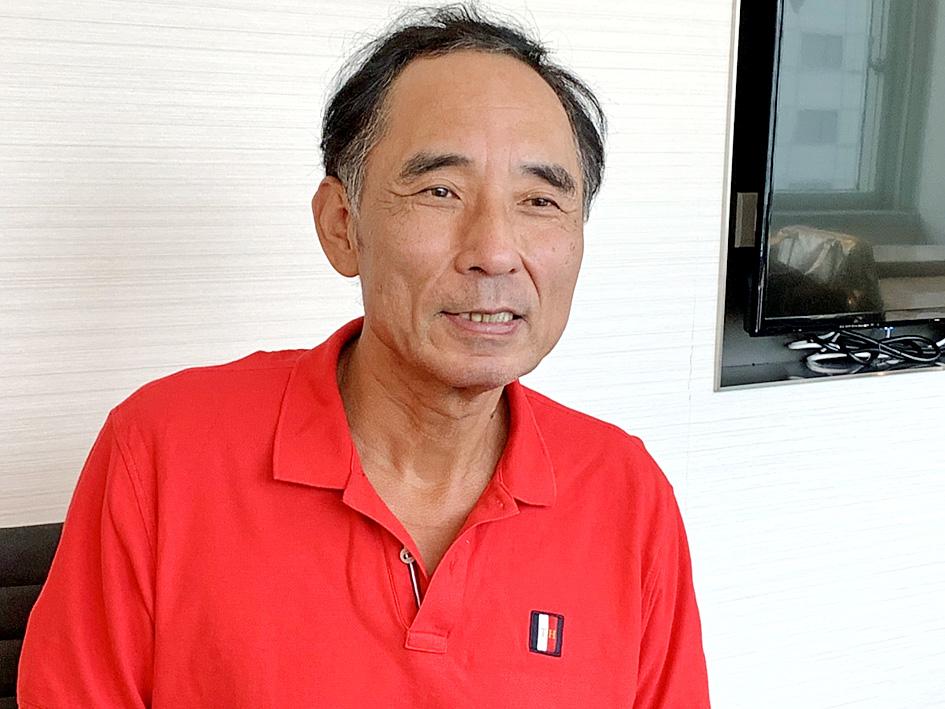Former Nanya Technology Corp (南亞科技) president Charles Kau (高啟全) has teamed up with Taiwanese semiconductor equipment maker Scientech Corp (辛耘) to invest in LVG Semiconductor (Huangshi) Co Ltd (祿億半導體) in China to provide wafer reclamation services there.
In a rare appearance in Taipei yesterday, Kau confirmed a report by the Chinese-language Liberty Times (the Taipei Times’ sister newspaper) that he is back after leaving China’s Tsinghua Unigroup Ltd (清華紫光) on Wednesday last week.
During the five-year period with the Chinese group, Kau helped Yangtze Memory Technology Corp (長江存儲), a memory manufacturing arm of Tsinghua Unigroup, develop and produce China’s first 3D NAND flash memory chips.

Photo: Hung Yu-fang, Taipei Times
LVG Semiconductor was founded in Huangshi City, Hubei Province, last year with an initial capital of US$29 million, the Liberty Times reported. The company has not formally started operations yet.
“Market demand is very strong in China, but there is a lack of reclaimed wafer suppliers there,” Kau said.
It is more cost-effective to provide reclaimed wafers from Chinese factories rather than importing them from Taiwan, as the logistics would add US$6 to the overall cost of every reclaimed wafer, he said.
LVG Semiconductor is building its first plant in Huangshi, which is to start operating in the second half of next year, he said.
It would recycle used 12-inch wafers by separating precious metal wires and chemicals to ensure they are not contaminated.
Kau denied that Chinese and foreign funds are involved in LVG Semiconductor.
The company’s shareholders and board directors are all from Taiwan, he said, adding that neither the Chinese government nor global investors have injected capital into the firm.
Kau said he is only an investor in LVG Semiconductor and holds a seat on the company’s board.
Scientech would be in charge of the new company’s operations, he said.
Kau added that he is scouting for other investment targets.
Scientech is a supplier of reclaimed wafers and semiconductor equipment with annual revenue of NT$3.95 billion (US$136.4 million) last year.

Nvidia Corp CEO Jensen Huang (黃仁勳) today announced that his company has selected "Beitou Shilin" in Taipei for its new Taiwan office, called Nvidia Constellation, putting an end to months of speculation. Industry sources have said that the tech giant has been eyeing the Beitou Shilin Science Park as the site of its new overseas headquarters, and speculated that the new headquarters would be built on two plots of land designated as "T17" and "T18," which span 3.89 hectares in the park. "I think it's time for us to reveal one of the largest products we've ever built," Huang said near the

China yesterday announced anti-dumping duties as high as 74.9 percent on imports of polyoxymethylene (POM) copolymers, a type of engineering plastic, from Taiwan, the US, the EU and Japan. The Chinese Ministry of Commerce’s findings conclude a probe launched in May last year, shortly after the US sharply increased tariffs on Chinese electric vehicles, computer chips and other imports. POM copolymers can partially replace metals such as copper and zinc, and have various applications, including in auto parts, electronics and medical equipment, the Chinese ministry has said. In January, it said initial investigations had determined that dumping was taking place, and implemented preliminary

Intel Corp yesterday reinforced its determination to strengthen its partnerships with Taiwan’s ecosystem partners including original-electronic-manufacturing (OEM) companies such as Hon Hai Precision Industry Co (鴻海精密) and chipmaker United Microelectronics Corp (UMC, 聯電). “Tonight marks a new beginning. We renew our new partnership with Taiwan ecosystem,” Intel new chief executive officer Tan Lip-bu (陳立武) said at a dinner with representatives from the company’s local partners, celebrating the 40th anniversary of the US chip giant’s presence in Taiwan. Tan took the reins at Intel six weeks ago aiming to reform the chipmaker and revive its past glory. This is the first time Tan

CUSTOMERS’ BURDEN: TSMC already has operations in the US and is a foundry, so any tariff increase would mostly affect US customers, not the company, the minister said Taiwanese manufacturers are “not afraid” of US tariffs, but are concerned about being affected more heavily than regional economic competitors Japan and South Korea, Minister of Economic Affairs J.W. Kuo (郭智輝) said. “Taiwan has many advantages that other countries do not have, the most notable of which is its semiconductor ecosystem,” Kuo said. The US “must rely on Taiwan” to boost its microchip manufacturing capacities, Kuo said in an interview ahead of his one-year anniversary in office tomorrow. Taiwan has submitted a position paper under Section 232 of the US Trade Expansion Act to explain the “complementary relationship” between Taiwan and the US